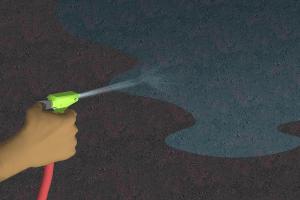Ultimate Guide to Cleaning Asphalt: Techniques, Tools, and Tips

-
Quick Links:
- Introduction
- Why Clean Asphalt?
- Tools Required for Asphalt Cleaning
- Pre-Cleaning Preparation
- Effective Cleaning Techniques
- Dealing with Common Stains
- Case Studies
- Expert Insights
- Maintenance Tips for Asphalt
- FAQs
Introduction
Asphalt surfaces, commonly found in driveways, parking lots, and roads, require regular cleaning to maintain their appearance and longevity. Over time, dirt, grime, oil, and other contaminants can accumulate, leading to unsightly stains and potential damage. This guide will provide you with all the necessary techniques, tools, and tips to effectively clean asphalt and keep it looking pristine.
Why Clean Asphalt?
Cleaning asphalt surfaces is essential for several reasons:
- Aesthetic Appeal: A clean asphalt surface enhances the overall look of your property.
- Longevity: Regular maintenance prevents deterioration caused by dirt and oil.
- Safety: Removing debris and stains reduces the risk of slips and falls.
- Property Value: Well-maintained asphalt can increase your property’s value.
Tools Required for Asphalt Cleaning
To effectively clean asphalt, you'll need a few essential tools:
- Pressure Washer: Ideal for removing tough stains and dirt.
- Broom: For sweeping away loose debris.
- Stiff-Bristle Brush: Useful for scrubbing stubborn stains.
- Detergents: Specialized asphalt cleaners or degreasers.
- Protective Gear: Gloves, goggles, and masks for safety.
Pre-Cleaning Preparation
Before starting the cleaning process, follow these steps:
- Clear the Area: Remove any vehicles, furniture, or obstacles from the asphalt surface.
- Sweep the Surface: Use a broom to remove loose dirt and debris.
- Inspect for Damage: Check for cracks or holes that may need repairs before cleaning.
Effective Cleaning Techniques
There are multiple techniques you can employ to clean asphalt:
1. Pressure Washing
Using a pressure washer is one of the most effective methods for cleaning asphalt. Follow these steps:
- Set the pressure washer to a low setting to avoid damaging the asphalt.
- Start from one corner and work your way across the surface in a systematic manner.
- Focus on heavily stained areas, applying detergent as needed.
2. Manual Scrubbing
If you don’t have access to a pressure washer, manual scrubbing can be effective:
- Apply a suitable asphalt cleaner to the stained area.
- Use a stiff-bristle brush to scrub the surface.
- Rinse thoroughly with a hose or bucket of water.
3. Chemical Cleaners
For tough stains, you may need to use chemical cleaners:
- Choose a cleaner designed for asphalt surfaces.
- Follow the instructions on the label for proper application.
Dealing with Common Stains
Different stains require different approaches:
Oil Stains
For oil stains, sprinkle baking soda or cat litter on the stain, let it absorb, and then scrub with a detergent.
Rust Stains
Rust stains can be tackled with a mixture of lemon juice and baking soda. Apply, let it sit, and rinse off.
Food and Beverage Stains
Use a degreaser or all-purpose cleaner for food and beverage stains, scrubbing as necessary.
Case Studies
Many homeowners and businesses have successfully cleaned their asphalt surfaces. Here are a couple of examples:
Case Study 1: Residential Driveway
A homeowner used a pressure washer and a specialized asphalt cleaner to remove years of oil stains from their driveway, resulting in a significant improvement in curb appeal.
Case Study 2: Commercial Parking Lot
A business owner hired professional asphalt cleaning services to restore their parking lot, leading to increased customer satisfaction and a more inviting atmosphere.
Expert Insights
We consulted with asphalt maintenance experts, who provided the following insights:
- Regular Maintenance: Clean your asphalt surfaces at least once a year to prevent buildup.
- Use the Right Products: Always opt for asphalt-specific cleaners to avoid damage.
Maintenance Tips for Asphalt
To prolong the life of your asphalt, consider these maintenance tips:
- Sealcoat every 2-3 years to protect against UV rays and water damage.
- Promptly address any cracks or holes to prevent further damage.
- Avoid using harsh chemicals that can degrade the asphalt.
FAQs
1. How often should I clean my asphalt?
It is recommended to clean asphalt surfaces at least once a year, or more frequently if you notice a buildup of dirt or stains.
2. Can I use bleach to clean asphalt?
No, bleach can damage asphalt and should not be used. Stick to cleaners specifically designed for asphalt surfaces.
3. What is the best way to remove oil stains from asphalt?
Use baking soda or cat litter to absorb the oil, followed by a scrub with a detergent.
4. Is a pressure washer necessary for cleaning asphalt?
While a pressure washer is effective, manual cleaning methods can also achieve good results, especially for smaller areas.
5. How long does it take for asphalt to dry after cleaning?
Asphalt typically takes 24-48 hours to fully dry after cleaning, depending on weather conditions.
6. Can I seal my asphalt after cleaning?
Yes, sealing your asphalt after cleaning is highly recommended to protect it from future damage.
7. Should I hire a professional for asphalt cleaning?
For larger areas or if you are unsure about the process, hiring a professional can save time and ensure the job is done correctly.
8. What should I do if my asphalt is cracked?
Address cracks promptly by filling them with an asphalt patching product before cleaning.
9. How can I prevent stains on my asphalt?
Regular cleaning and sealing can help prevent stains from setting in.
10. Are there environmentally friendly options for cleaning asphalt?
Yes, look for biodegradable cleaners that are safe for the environment.
Random Reads
- How to install metal roofing
- How to install metal studs
- Dd puzzles best puzzles traps
- Dark mode google docs
- Creative diy rope baskets
- How to see files in cmd
- How to see google chat history
- How to disassemble clean honeywell quietset tower fan
- Easily convert drm protected m4p files to mp3
- How unlock iphone verizon